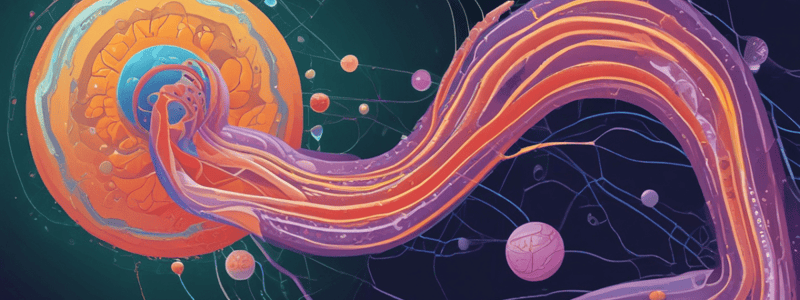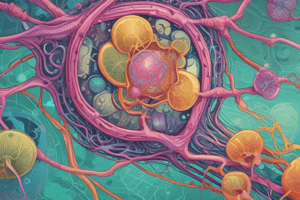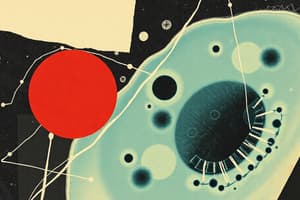Podcast
Questions and Answers
What is the primary focus of the study of botany? change
What is the primary focus of the study of botany? change
- The study of plants (correct)
- The study of genetic variation
- The study of microorganisms
- The study of animals
Which biomolecule provides energy and structure for organisms?
Which biomolecule provides energy and structure for organisms?
- Proteins
- Lipids
- Nucleic Acids
- All of the above (correct)
What is the process by which cells produce new cells?
What is the process by which cells produce new cells?
- Mitosis (correct)
- Mutation
- Genetics
- Meiosis
What is the primary mechanism of evolution?
What is the primary mechanism of evolution?
What is the term for the study of the relationships between organisms and their environment?
What is the term for the study of the relationships between organisms and their environment?
What are the basic units of life?
What are the basic units of life?
Flashcards
Botany
Botany
The study of plants, focusing on their structure, function, growth, and evolution.
Cell
Cell
The basic unit of life, characterized by a cell membrane, cytoplasm, and genetic material.
Cell Division
Cell Division
The process of cells dividing to produce new cells, crucial for growth and development.
Population Dynamics
Population Dynamics
Signup and view all the flashcards
Nutrient Cycles
Nutrient Cycles
Signup and view all the flashcards
Theory of Evolution
Theory of Evolution
Signup and view all the flashcards
Study Notes
Overview of Biology
- Biology is the scientific study of life and living organisms
- It explores the structure, function, growth, evolution, distribution, and taxonomy of all living things
Branches of Biology
- Botany: study of plants
- Zoology: study of animals
- Microbiology: study of microorganisms
- Ecology: study of the relationships between organisms and their environment
- Genetics: study of heredity, genes, and genetic variation
- Biochemistry: study of the chemical processes that occur within living organisms
- Molecular Biology: study of the structure and function of biological molecules
Biomolecules
- Carbohydrates: provide energy and structure for organisms
- Proteins: perform a wide range of functions, including catalyzing metabolic reactions, replicating DNA, and responding to stimuli
- Lipids: provide energy and structure for organisms
- Nucleic Acids: contain the genetic instructions for an organism (DNA and RNA)
Cell Biology
- Cell Structure: cells are the basic units of life, consisting of a cell membrane, cytoplasm, and genetic material
- Cellular Processes: cells perform various functions, including metabolism, growth, and reproduction
- Cell Division: cells can divide to produce new cells through mitosis and meiosis
Evolution
- Theory of Evolution: all species of life have evolved over time through natural selection, genetic drift, mutation, and gene flow
- Mechanisms of Evolution: evolution occurs through the processes of mutation, genetic drift, gene flow, and natural selection
- Evidence for Evolution: fossil record, comparative anatomy, and molecular biology provide evidence for evolution
Ecology
- Ecosystems: communities of organisms and their environment
- Energy Flow: energy flows through ecosystems from producers to consumers
- Nutrient Cycles: nutrients are cycled through ecosystems
- Population Dynamics: populations of organisms change over time due to birth, death, and migration rates
Studying That Suits You
Use AI to generate personalized quizzes and flashcards to suit your learning preferences.




